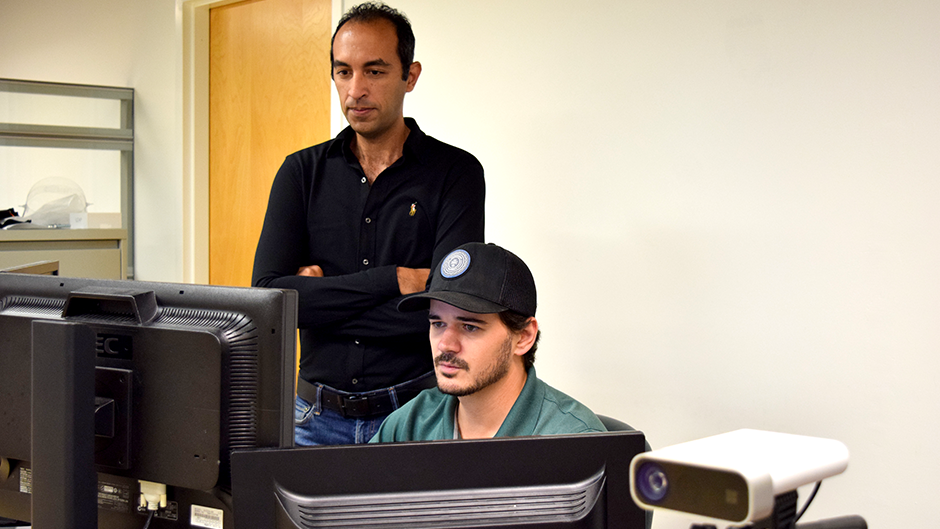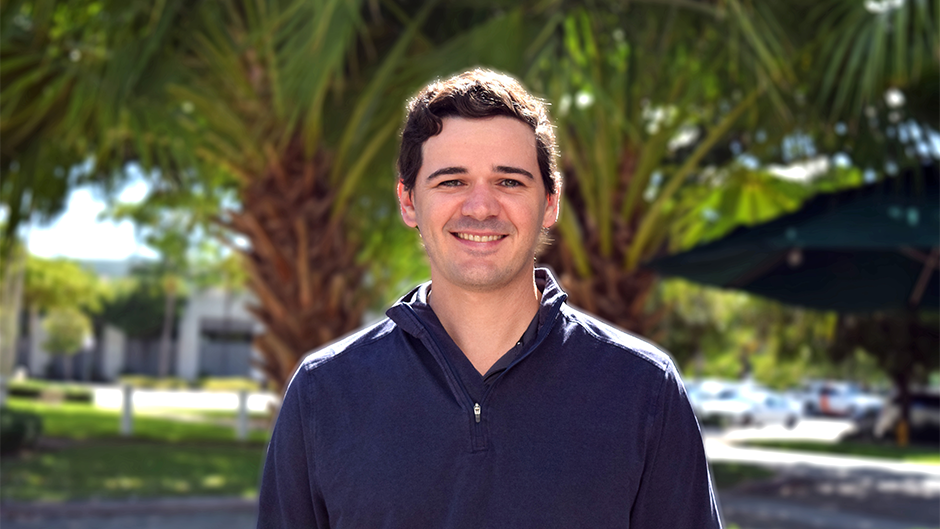Growing up, Zachary Ripic, Ph.D. ’22, played multiple sports and, like many athletes, suffered several injuries. This led him down the academic path to study kinesiology and exercise science, with a master’s degree focus on biomechanics and gait analysis. When searching for a Ph.D. program to further his studies, Ripic was drawn to the School of Education and Human Development Department of Kinesiology and Sport Sciences, particularly the Sports Medicine and Motion Analysis Laboratory at the Max Orovitz Laboratories.
“I saw an opportunity to not only build upon skills in motion analysis but also get involved with research focused on Parkinson’s disease and aging as well as collaborative projects with the Sports Medicine Institute,” said Ripic.
He utilized the lab’s KinaTrax markerless motion capture system, donated to the University of Miami by KinaTrax President Steven Cadavid, Ph.D. ’11, to conduct his research. Unlike traditional marker-based motion capture systems, which require sensors to be placed on the subject’s body, like in moviemaking, a markerless motion capture system uses high-speed video cameras to record the subject’s motion.
Ripic took this technology one step further, utilizing artificial intelligence to deliver affordable, accessible, and accurate biomechanical analyses, which can provide valuable information to physicians, physical therapists, and coaches. While his dissertation focused on the use of markerless motion capture for clinical gait analysis of older adults and patients with neurologic disorders, Ripic also investigated the potential of utilizing the technology to help the Hurricanes baseball team analyze players’ motions to improve athletic performance.
Believing he has only scratched the surface of what markerless motion capture systems can do, Ripic decided to stay on at UM’s Sports Medicine and Motional Analysis Lab. In his postdoctoral position, he plans to continue developing a patient/athlete monitoring system and exploring its limitless applications.
“In collaboration with the UM Sports Medicine Institute, I’m currently working on developing a markerless screening procedure that can be included in athlete testing and return to sport protocols. Additionally, in collaboration with the Laboratory of Neuromuscular Research and Active Aging, I am using the markerless system to quantify functional responses to yoga and resistance training interventions in patients with Parkinson’s disease,” explains Ripic of his postdoctoral research. “In the future, I would like to refine our markerless-driven musculoskeletal model and implement this for in-clinic gait monitoring following anterior cruciate ligament (ACL) reconstruction.”
Calling this research game changing, Ripic’s mentor and doctoral advisor, Moataz Eltoukhy, Ph.D. ’11, who’s an alumnus himself, said he was impressed with Ripic from the moment they first met.
“In recruiting Zach as a Ph.D. candidate, it was apparent that he was going to have a significant impact on our lab,” said Dr. Eltoukhy, associate professor, Department of Kinesiology and Sport Sciences, and associate professor of Industrial & Systems Engineering. “Zach finished his dissertation in just three years. He’s the first in our department to do so. We are honored to have him stay on and continue his groundbreaking research.”
Ripic received the Outstanding Doctoral Student in Exercise Physiology award from his school at the 2023 Awards of Excellence celebration in May.

Postdoctoral Associate Zachary Ripic, and Dr. Moataz Eltoukhy, associate professor in the Department of Kinesiology and Sport Sciences, looking over data at the Sports Medicine and Motion Analysis Laboratory at the Max Orovitz Laboratories.

